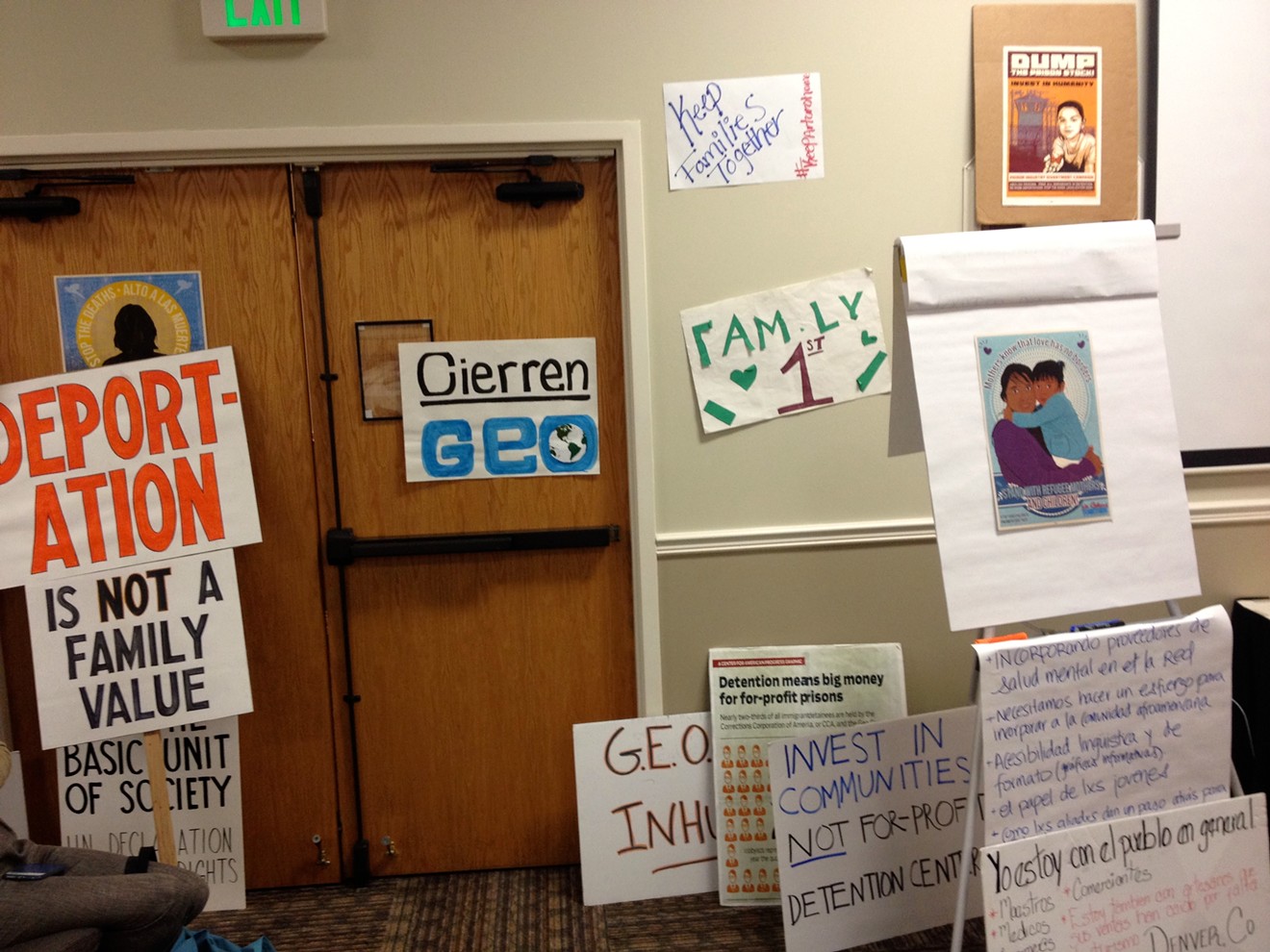When Marge Taniwaki recently visited Aurora's immigration detention center, a 1,500-bed facility run by the private prison company GEO Group, a detainee's descriptions of conditions there reminded her of what she and her family had experienced inside a Japanese internment camp during World War II.
“The things related to me were very much like what I experienced in the internment camp," Taniwaki, a Japanese-American activist, told a roomful of immigrant-rights advocates on Friday, May 18. She went on to describe the Cameroonian man's allegations that the facility in Aurora provides detainees with low-quality food and medical care and that it keeps bright lights on all the time, disrupting sleeping patterns.
Taniwaki was part of a panel called "ICE on Trial," the conclusion of a three-day summit held for members of the Detention Watch Network, a national coalition of immigrant advocacy groups. More than 200 people crowded a rented event space in Aurora for what was being teased as a “people’s tribunal to hold [Immigration and Customs Enforcement] accountable for the systemic abuses in their detention facilities and their culture of secrecy.” But the occasion was not an actual trial; as far as the summit's attendees were concerned, ICE is guilty on all counts.
Jeanette Vizguerra — the immigrant-rights activist and mother of four who, after taking sanctuary in Colorado, was named one of TIME magazine’s 100 Most Influential People in the World — was there, as was Jamie Laurie (Jonny 5) of the politically active music group Flobots.
The mock trial started after the room chanted “Up, up with liberation! Down, down with deportation!" Then three “judges,” including Taniwaki, were introduced. Each focused their monologues on trips they’d recently made to the facility in Aurora to visit detainees.
Alewia Roba, a young activist and recent graduate of Metropolitan State University, recounted meeting another detainee originally from Cameroon named Henry, who was being released from the detention center but had no idea where to go next, since he’d been transferred to the Aurora facility from another state and had no bearings in Colorado.
Roba was distraught about not knowing where to refer the newly freed man until a translator who was at the detention center mentioned Casa de Paz, a free place for released detainees and their families to stay and receive referrals for other services to help them get on their feet (“The House That Peace Built,” July 2016).
The third “judge” at Friday’s event was local activist Vinnie Cervantes. He’d recently visited a detainee named Geovanny from El Salvador, who’d crossed the border into Arizona with his 21-year-old son and applied for asylum. But ICE separated them, sending Geovanny’s son to Washington State and transferring the father to California, then Colorado.
Cervantes says that Geovanny wasn’t receiving proper care for his polio, was forced to join a work program that paid him a dollar a day or else he’d lose basic privileges like watching TV (the facility's labor practices are the subject of a federal class action case against the GEO Group), and that Geovanny had, on occasion, been served spoiled milk for breakfast and undercooked chicken for dinner.
Cervantes then had observations of his own. “It’s mostly people of color who are employed there, which is disappointing," he noted.
Cervantes also described how visitors aren’t allowed to bring cell phones or even paper and writing instruments to the detention center. “So you can’t even properly document what’s going on there," he says.
“Geovanny told me that we shouldn’t be doing all this — it’s inhumane and cruel. He doesn’t understand why we’d do this when he was just trying to protect his family," Cervantes concluded. “I hope that this angered you, and you keep that anger and do something about it."
In response to similar allegations of forced labor and ill treatment, the GEO Group told Westword in September 2017, “The Aurora, Colorado, facility has a long-standing record of providing highly rated services in a safe, secure, and humane residential environment while treating all those entrusted to our care with the respect and dignity they deserve."
[
{
"name": "Air - MediumRectangle - Inline Content - Mobile Display Size",
"component": "12017618",
"insertPoint": "2",
"requiredCountToDisplay": "2"
},{
"name": "Editor Picks",
"component": "17242653",
"insertPoint": "4",
"requiredCountToDisplay": "1"
},{
"name": "Inline Links",
"component": "18838239",
"insertPoint": "8th",
"startingPoint": 8,
"requiredCountToDisplay": "7",
"maxInsertions": 25
},{
"name": "Air - MediumRectangle - Combo - Inline Content",
"component": "17261320",
"insertPoint": "8th",
"startingPoint": 8,
"requiredCountToDisplay": "7",
"maxInsertions": 25
},{
"name": "Inline Links",
"component": "18838239",
"insertPoint": "8th",
"startingPoint": 12,
"requiredCountToDisplay": "11",
"maxInsertions": 25
},{
"name": "Air - Leaderboard Tower - Combo - Inline Content",
"component": "17261321",
"insertPoint": "8th",
"startingPoint": 12,
"requiredCountToDisplay": "11",
"maxInsertions": 25
}
]













